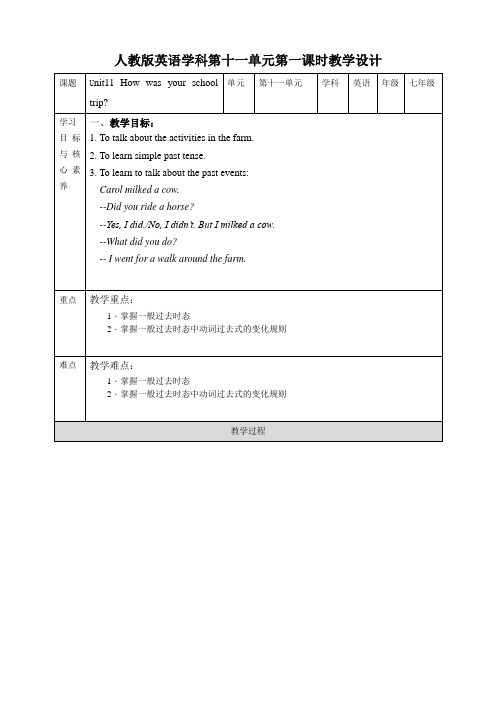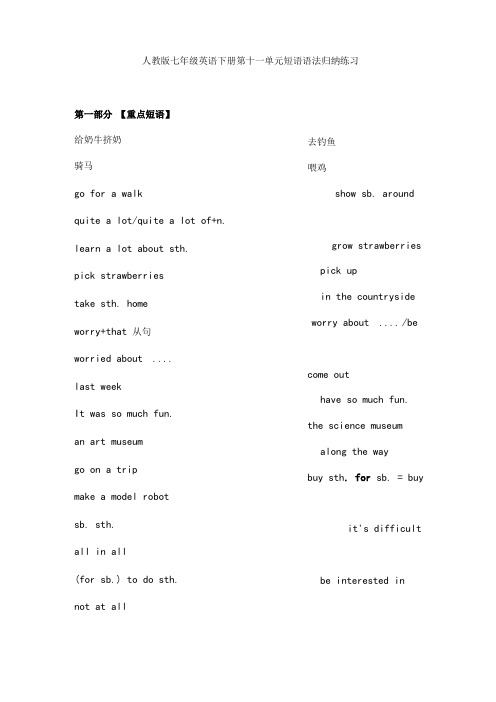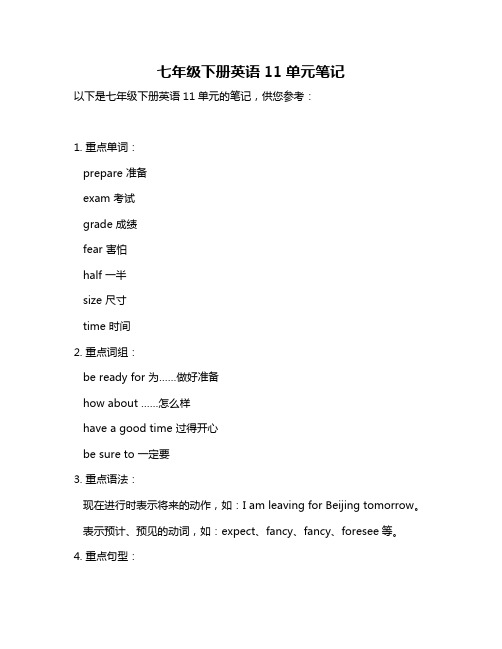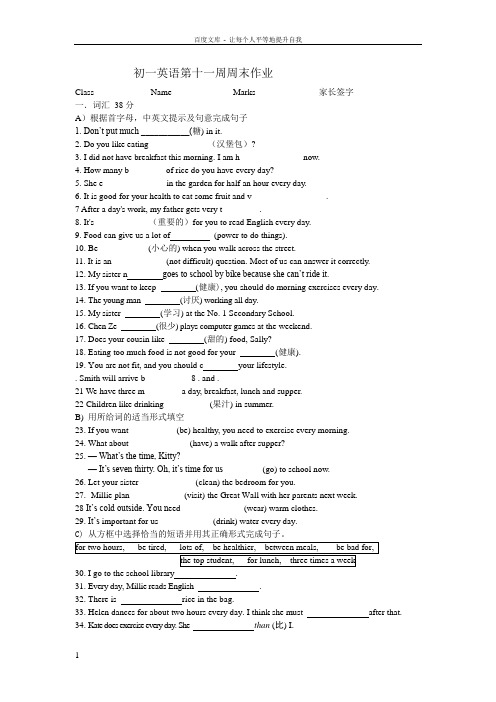第十一周七年级英语学习
初中英语七年级下册 Unit11How was your school trip

人教版英语学科第十一单元第一课时教学设计课题U nit11 How was your schooltrip?单元第十一单元学科英语年级七年级学习目标与核心素养一、教学目标:1. To talk about the activities in the farm.2. To learn simple past tense.3. To learn to talk about the past events: Carol milked a cow.--Did you ride a horse?--Yes, I did./No, I didn’t. But I milked a cow. --What did you do?-- I went for a walk around the farm.重点教学重点:1.掌握一般过去时态2.掌握一般过去时态中动词过去式的变化规则难点教学难点:1.掌握一般过去时态2.掌握一般过去时态中动词过去式的变化规则教学过程课堂小结Summary1.重点单词:milk,cow,horse,feed,farmer,quite2.重点短语:go for a walk, milk a cow, ride a horse, feed chickens, talk witha farmer, take some photos, quite a lot3.重点句式:—Did you see any cows?—Yes, I did. I saw quite a lot.—Did you ride a horse?—No, I didn't. But I milked a cow.板书go for a walk, milk a cow, ride a horse, feed chickens, talk with a farmer, take some photos, quite a lot。
七年级英语下学期第十一周周末作业试题试题

第三中学2021-2021学年七年级英语下学期第十一周周末作业试题〔无答案〕牛版一、单项选择〔一共15小题;每一小题1分,计15分〕〔〕1.There is _____ “h〞 and _____ “u〞 in the word “house〞.A. a…aB. an…aC. an…anD. a…an 〔〕2.We will arrive _________Beijing __________ the afternoon of March 3rd.A. at, inB. in, onC. in, inD. at, at〔〕3.There a basketball match in our school next Sunday.A. will haveB. will beC. is going to haveD. was 〔〕4. the road and you’ll see the hospital.A. CrossingB. Walk crossC. Walk acrossD. Across〔〕5.He likes sleeping the window .A. with, openedB. without, closeC. without, openedD. with, open〔〕6. Why_______ the modern city with us ?A. not to visitB. don’t visitC. not visitD. not visiting〔〕7.-- Which floor does Anna live ______? -- The _____ floorA. in; nineteenthB. in; nineteenC. on; nineteenthD. on; nineteen〔〕8. ______ bad news it is !A. WhatB. What aC. HowD. How a〔〕9. He is ______ at the ______ newsA. amazing;amazedB. amazed;amazedC. amazing;amazingD. amazed;amazing〔〕10. -- ________ TV do you watch every day? ---- About three hours.A. How longB. How muchC. How manyD. How often〔〕11. We read 10206 like this:_____________A.one thousand, two hundred and sixB. one thousand two hundredsand sixC. ten thousand, two hundred and sixD. ten thousands, two hundredsand six〔〕12. The baby _______ stop crying ______ his mother comes back.A. won’t, untilB. will, butC. will, untilD.won’t, but〔〕13. Each of the singers _______ a ________ swimming pool.A. has; fifty-metres-longB. have; fifty-metres-longC. have; fifty-metre-longD. has; fifty-metre-long〔〕14. --- Mum, must I go home now?---No, you . But you should be back before 10.p.m.A. mustn’tB. needn’tC. can’tD. may not〔〕15. –Sorry, Tom. I’m busy today. I can’t go swimming with you.-- ___________A. No problem.B. You’re welcome.C. That’s right.D. Never mind.二、完形填空〔10分〕阅读以下短文,从文后所给A、B、C、D四个选项里面选出一个最正确答案。
第十一周(考查范围:Unit 6)——2023-2024学年牛津译林版英语七年级上册周周练

第十一周考查范围:Unit 6一、单项选择1.—I want to watch TV the whole day after the long journey.—You shouldn't watch TV too much. It's bad ______ your eyes.A.withB.inC.onD.for2.Could you please put some _____ in my cup? I'd like sweet coffee.A. sugarB. saltC. iceD. pepper3.It is not good to watch ______ TV or play ______ computer games.A.too much; too manyB.much too; many tooC.too many; too muchD.too many; too many4.—What would you like for lunch, Sandy?—I'd like ______ like tomatoes, carrots or cabbages.A.meatB.eggsC.vegetablesD.fruit5.—What are you going to do this weekend?—I plan ______ Mount Huaguoshan with my parents.A.to climbB.climbingC.to climbingD.and climb6.Sometimes I feel hungry ______ meals, so I eat an apple or a pear.A.fromB.atC.withD.between7.Today is Saturday. Amy ______ get up early.A.don't needB.doesn't needC.needn't toD.doesn't need to8.Mr. Black, you are becoming healthier and healthier. Please keep on ______.A.ranB.to runC.runsD.running9.—Kate, ______ apple on the table is for you. Eat it before you go to school.—Thanks, Mum. ______ apple a day keeps the doctor away.A.the; AnB.an; AnC.an; The.D.the; The10.Many teenagers want to be _____ like Zhong Nanshan when they grow up.A.writersB.engineersC.doctorsD.inventors11.We need to buy some ______ and two ______ for supper today.A. tomatoes ; kilos of meatsB. tomatoes ;kiloes of meatC. tomatoes;kilos of meatD. tomatos;kiloes of meats12.There are some _____ and _____ on the table.A. potatoes; teaB. chicken; sweetsC. porks;tomatoesD. milk; tomatoes13.—______ do you have your club class on Wednesday afternoon?—About 90 minutes.A. How oftenB. How soonC. How longD. How many14.—May I have ______ to drink? —Of course, there is ______ apple juice in the fridge.A. something; a number ofB. anything; a number ofC. anything; a lot ofD. something; a lot of15.—Would you like another cup of milk?—_______. I’m full now.A. No, thank youB. All rightC. That's all rightD. Never mind二、完形填空"Who would you like to change your life with if possible(可能)?" Last week, we asked many middle school students this question. The following are some of their 1 .Zhang Yike,12I want to change my life with my friend, Wang Xiaohui. She is studying in England now. She has been to(去过) many 2 , such as the US and France. I wish to visit these places, too. And she 3 very good English. I can visit many beautiful countries, eat delicious food and meet different kinds of people there 4 I change my life with her.Qiu Haoran,14I'd like to change my life with my Chinese teacher Miss Zhao. Miss Zhao is a very kind lady. She 5 a lot because she likes reading and travelling. She always tries to make her classes lively and 6 . We all like her classes. I also want to be a nice teacher and be popular with my 7 .Tan Bo,13I will change my life with my brother. My brother is a college(大学) student now. He doesn't have to go to 8 all the time. He can study the subjects he is interested in. And he even has a part-time job to make money. To 9 , all of these are very interesting. I really want a life 10 that.1. A. answers B. problems C. questions D. changes2.A. countries B. villages C. towns D. cities3.A. says B. speaks C. learns D. tells4.A. when B. because C. if D. after5.A. teaches B. knows C. thinks D. asks6.A. busy B. difficult C. important D. interesting7.A. parents B. friends C. classmates D. students8.A. work B. class C. libraries D. meetings9.A. me B. him C. you D. them10.A. at B. on C. for D. like三、阅读理解AWhat are we having?It’s morning, it’s morning.We’re having breakfast with our mum.Bread and milk, milk and bread.It’s morning, it’s morning.It’s lunchtime, it’s lunchtime.We’re having lunch with our friends.Eggs and chips, delicious fruit.It’s lunchtime, it’s lunchtime.It’s afternoon, it’s afternoon.We’re having tea in the garden.Chocolate cake, orange juice.We’re having tea in the afternoon.It’s evening, it’s evening.We’re having dinner with Mum and Dad.Chicken and rice, rice and chicken.It’s evening, it’s evening.1.What time do they have lunch?A.At eleven o'clock.B.At half past eleven.C.At twelve o'clock.D.At half past twelve.2.What do they drink in the garden?A.Coffee with sugar.B.Tea and juice.C.Some water.D.Chocolate milk.3.Whom do they have supper with?A.Friends.B.Teachers.C.Parents.D.Cousins.4.They eat chips and drink milk in the morning.5.There are five kinds of fruit for their lunch.BThe weather is getting hotter. You are thirsty playing basketball or riding home from school. A cold drink may be just the thing. But be careful what you are drinking. Something that looks cool may not be good for your health.There are plenty of “energy drinks” on the market. Most of them have beautiful colors and cool names. The lists on them tell you they are helpful to your health. Sounds great! But after a careful check you may find that most energy drinks have lots of caffeine(咖啡因) in them. These drinks are especially aimed at young people, students, busy people and sports players. Makers sometimes say their drinks make you better at sports and can keep you awake. But be careful not to drink too much.Caffeine makes your heart beat fast, Because of this, the International Olympic Committee has limited its use. Caffeine in most energy drinks is at least as strong as that in a cup of coffee or tea. Possible health dangers have something to do with energy drinks. Just one box of energy drink can make you nervous, have difficulty sleeping and can even cause heart problems. Scientists say that teenagers should be discouraged from taking drinks with a lot of caffeine in them.1.The "energy drinks" are aimed at ________.A.busy people and sports playersB.students, busy people, young people and sports playersC.old people, young people and studentsD.actors, singers, students and busy people2.Why does the International Olympic Committee limit caffeine’s use?A.Because most energy drinks have lots of caffeine in them.B.Because caffeine is helpful to people's health.C.Because caffeine makes your heart beat fast.D.Because scientists say that people should be discouraged from taking caffeine.3.People can’t drink too much energy drinks because they may cause ________.A.heart problemsB.nervousnessC.sleeping troubleD.A、B and C4.From the passage we can know that ________.A.advertisements are important in getting people to buy energy drinksB.energy drinks are helpful to teenagers' studyC.sports players need to drink a lot of energy drinksD.energy drinks are especially aimed at teenagers5.Which of the following can be the best title of the passage?A.What's the Use of Energy Drinks?B.Who Can Drink Energy Drinks?C.What’s That in Energy Drinks?D.Why Can’t We Buy Energy Drinks?四、任务型阅读Now that the weather is really getting cold outside, it's time for some delicious winter drinks. In the US and other countries, there are special drinks that we like to drink in winter. These drinks are tasty and easy to make and they warm us up ,too!One good winter drink is hot chocolate. You just need to put some chocolate powder (粉) in a mug and then fill it with hot water. We usually put tiny marshmallows (棉花糖) on top—the hot chocolate melts (融化) the marshmallows and makes a sweet and yummy (美味的) drink.Eggnog (蛋奶酒) is another popular (受欢迎的) winter drink, especially (尤其) around Christmas. It's made with milk, wine, sugar, eggs and so on. It's a sweet drink that can make you feel full and keep you warm.Lastly, there's hot apple cider (苹果汁) . We usually drink cool cider in the fall (秋天) , but when winter comes, we heat (加热) it up a bit. It tastes especially good if you add a little bit of cinnamon on top. Actually, I think I could drink it all year round!1.How do people feel after drinking winter drinks?_________________________________2.What do we need to make hot chocolate?_________________________________3.When is eggnog more (更) popular in the US?_________________________________4.Do people usually drink hot apple cider in the fall?_________________________________5.How many kinds of winter drinks are mentioned (提及) in the passage?_________________________________五、根据汉语提示写出单词1.I would like some ______ (蔬菜) for lunch today.2.Cakes, sweets are sweet ______ (零食) . They aren't healthy food.3.I often feel very ______ (饿) at 11:00 am.4.Exercising every day is good for your ______ (健康).5.They are trying to use 3D printers to print food that is both ______ (美味的) and good for us.六、根据对话情景补全对话A:Michael,do you like sports?B:Of course I do. Sports are good for our health.A: ①_________________________B:Football.A:How often do you play football?B:Four times a week. ②_________________________ What's your favorite sport?A:I don't like sports at all. But I like watching TV.B: ③_________________________A:I watch TV every day.B:Really? ④_________________________A:Three hours.B:Watching TV too much is bad for your eyes.A:You're right. Maybe I should ⑤_________________________七、书面表达假设你在"2021年淮安国际美食节"上遇到了一位来自美国的学生Peter,他目前在淮安的某所中学做交换生,通过交谈,你了解了很多关于他的信息。
七年级下册十一单元英语学习旅行作文公园

A Joyful Trip to the ParkLast Sunday, my classmates and I embarked on anexciting trip to the local park, a journey that was filled with laughter, fun, and a profound appreciation fornature's beauty. The sun was shining brightly, and the sky was a vibrant blue, setting the perfect mood for our adventure.As we entered the park, we were immediately greeted by a sea of lush green trees and colorful flowers. The air was filled with the sweet scent of blossoms, and the birds were singing their cheerful melodies. We couldn't wait to explore every corner of this magical place.Our first stop was the lake, where we watched the ducks and geese swimming gracefully. Some of us even fed them, and it was fascinating to see how eagerly they came forward to nibble at the breadcrumbs. After that, we ventured into the woods, where we played hide-and-seek and explored the various plant life. The serene atmosphere and the natural beauty of the park were truly captivating.We also visited the playground, where we played on the swings, slides, and see-saws. The laughter and screams of joy filled the air, creating a lively and cheerful atmosphere. It was a refreshing break from the monotony of our daily school life.However, the most memorable part of our trip was when we sat together on the grass and shared our snacks. We talked about our favorite activities, our dreams, and our aspirations for the future. It was a moment of true camaraderie and bonding, as we realized that despite our differences, we were all united by our shared experiences and our love for learning.As the sun began to set, we reluctantly packed up our belongings and prepared to leave. But before we did, we took a group photo to commemorate our wonderful day at the park. It was a day that we would cherish forever, filled with memories that would stay with us for a lifetime.In conclusion, our trip to the park was not just an outing; it was an enriching experience that taught us to appreciate the beauty of nature and the importance of spending time with our friends. It reminded us that thereis more to life than just studies and exams, and that it is essential to make time for fun and relaxation. We are already looking forward to our next adventure together.**公园的快乐之旅**上个周日,我和同学们踏上了一次激动人心的公园之旅。
人教版七年级英语下册:第十一单元短语语法归纳练习含答案

人教版七年级英语下册第十一单元短语语法归纳练习第一部分【重点短语】给奶牛挤奶骑马go for a walkquite a lot/quite a lot of+n. learn a lot about sth.pick strawberriestake sth. homeworry+that 从句worried about ....last weekIt was so much fun.an art museumgo on a tripmake a model robotsb. sth.all in all(for sb.) to do sth.not at all 去钓鱼喂鸡show sb. aroundgrow strawberries pick upin the countryside worry about .... /become outhave so much fun. the science museumalong the waybuy sth. for sb. = buyit's difficultbe interested in(doing) sth.【答案】从左至右:milk a cow; go fishing; ride a horse; feed chickens;去散步=t2卜《a walk;带领某人参观;相当多的;关于… 学到很多;种草莓;摘草莓;捡起/接某人;带…回家;在农村;担心……;担心某人某事;上周;出来/出版/开花;如此有趣;玩得非常开心;一个艺术博物馆;科学博物馆;去旅行;沿途;制作一个机器人模型;为某人买某物;总之;对某人来说做某事很困难;根本不/一点也不;对(做)…感兴趣第二部分【重点语法】一、一般过去时1.定义一般过去时表示过去某个时间或一段时间内发生的动作或状态;也可表示过去经常或反复发生的动作。
e.g.I got up at 7:00 yesterday.我昨天7 点起床。
七年级下册英语11单元笔记

七年级下册英语11单元笔记
以下是七年级下册英语11单元的笔记,供您参考:
1. 重点单词:
prepare 准备
exam 考试
grade 成绩
fear 害怕
half 一半
size 尺寸
time 时间
2. 重点词组:
be ready for 为……做好准备
how about ……怎么样
have a good time 过得开心
be sure to 一定要
3. 重点语法:
现在进行时表示将来的动作,如:I am leaving for Beijing tomorrow。
表示预计、预见的动词,如:expect、fancy、fancy、foresee等。
4. 重点句型:
I am leaving for Beijing tomorrow。
我明天要去北京。
How about going to the park?去公园怎么样?
5. 重点话题:
谈论未来计划和安排,如旅游计划、考试准备等。
6. 重点写作:
用现在进行时写一封信,告诉朋友你即将去旅行或参加某个活动,并询问对方的计划和安排。
7. 重点阅读:
阅读一篇关于旅行的文章,了解旅行前的准备和注意事项。
初一英语第十一周周末作业

初一英语第十一周周末作业Class ____________ Name _____________ Marks _____________ 家长签字____________ 一.词汇38分A)根据首字母,中英文提示及句意完成句子1. Don’t put much ___________(糖) in it.2. Do you like eating _____________(汉堡包)?3. I did not have breakfast this morning. I am h______________ now.4. How many b________ of rice do you have every day?5. She e______________ in the garden for half an hour every day.6. It is good for your health to eat some fruit and v_________________.7 After a day's work, my father gets very t________ .8. It's ___________ (重要的)for you to read English every day.9. Food can give us a lot of (power to do things).10. Be ___________(小心的) when you walk across the street.11. It is an ____________(not difficult) question. Most of us can answer it correctly.12. My sister n goes to school by bike because she can’t ride it.13. If you want to keep (健康), you should do morning exercises every day.14. The young man (讨厌) working all day.15. My sister (学习) at the No. 1 Secondary School.16. Chen Ze (很少) plays computer games at the weekend.17. Does your cousin like (甜的) food, Sally?18. Eating too much food is not good for your (健康).19. You are not fit, and you should c your lifestyle.. Smith will arrive b__________ 8 . and .21 We have three m________ a day, breakfast, lunch and supper.22 Children like drinking __________(果汁) in summer.B) 用所给词的适当形式填空23. If you want __________ (be) healthy, you need to exercise every morning.24. What about _____________ (have) a walk after supper?25. —What’s the time, Kitty?—It’s seven thirty. Oh, it’s time for us ________ (go) to school now.26. Let your sister ____________ (clean) the bedroom for you.lie plan ____________(visit) the Great Wall with her parents next week.28 It’s cold outside. You n eed ______________(wear) warm clothes.29. It’s important for us ____________(drink) water every day.C) 从方框中选择恰当的短语并用其正确形式完成句子。
仁爱版七年级第一学期英语教学计划

仁爱版七年级第一学期英语教学计划一、教学目标2.使学生掌握基本的英语语音、词汇、语法知识,提高学生的英语听说读写能力。
3.帮助学生建立初步的英语思维方式,培养学生的跨文化交际意识。
二、教学内容1.教材:使用仁爱版《英语》教材,按照七年级上册的教学内容进行教学。
2.教学内容:包括字母表、单词、短语、句子、语法、功能项目等。
三、教学时间1.学期课时:本学期共36周,每周4课时,共计144课时。
2.单元课时:每个单元共计12课时,其中听说课4课时,读写课4课时,语法课2课时,复习课2课时。
四、教学方法1.任务型教学法:通过完成各种真实的任务,激发学生的学习兴趣,培养学生的英语实践能力。
2.情境教学法:创设各种真实的语言环境,让学生在情境中学习英语,提高学生的语言运用能力。
3.合作学习法:鼓励学生之间互相合作,共同完成学习任务,培养学生的团队协作能力。
4.直观教学法:利用图片、实物、多媒体等直观教具,帮助学生更好地理解和学习英语。
五、教学评价1.形成性评价:通过课堂表现、作业完成情况、单元测试等方式,及时了解学生的学习情况,给予学生反馈,促进学生的学习进步。
2.终结性评价:在本学期末进行期末考试,全面检测学生的英语学习成果。
六、教学措施1.加强语音教学,使学生掌握正确的英语发音,提高学生的听说能力。
2.注重词汇教学,扩大学生的词汇量,提高学生的语言运用能力。
3.系统地教授语法知识,使学生掌握基本的英语语法规则。
4.积极开展英语角、英语剧社等活动,为学生提供更多的英语实践机会。
七、教学计划1.第一周:Unit1Greetingsandintroduction,学习基本的问候语和介绍自己。
2.第二周:Unit2Myfamily,学习介绍家庭成员的表达方式。
3.第三周:Unit3Myschool,学习介绍学校和课程的表达方式。
4.第四周:Unit4Myhometown,学习介绍家乡的表达方式。
5.第五周:Unit5Myfriends,学习介绍朋友的表达方式。
- 1、下载文档前请自行甄别文档内容的完整性,平台不提供额外的编辑、内容补充、找答案等附加服务。
- 2、"仅部分预览"的文档,不可在线预览部分如存在完整性等问题,可反馈申请退款(可完整预览的文档不适用该条件!)。
- 3、如文档侵犯您的权益,请联系客服反馈,我们会尽快为您处理(人工客服工作时间:9:00-18:30)。
2013-2014年第11周七年级英语学习指导1-6单元复习,备考期中Unit 1 Can you play the guitar ?1、can+动词原形,它不随主语和数而变化。
(1)含有can的肯定句:主语+can+谓语动词的原形+其他。
(2)变一般疑问句时,把can提前:Can+主语+动词原形+其他?肯定回答:Yes,主语+can。
否定回答:No,主语+can't.(3)含有can的否定句:主语+can't+动词的原形+其他。
(4)含有can的特殊疑问句:特殊疑问词+can+主语+动词原形+其他?2、may+动词的原形。
(may为情态动词)一般疑问句是把may提前,肯定回答是:Yes,主语 +may。
否定回答是:No,主语+mustn't。
或please don't。
join+某个组织,俱乐部,party,参军,党派等“加入”Join sb. “参加到某人中” join in (doing)sth “加入做......,参加某个活动” Join in=take part in +活动,比赛3、说某种语言:speak+语言4、play+球、棋、牌;play+the+乐器。
5、擅长于(做)什么:be good at +名词/动ing6、帮助某人做某事:help sb. (to ) do sth. help sb. with sth.7、我能知道你名字吗?May I know your name?8、想要做什么:want to do sth 例如:I want to learn about art.Unit 2 What time do you go to school ?1、what time和when引导的特殊疑问句。
(1)对时间提问用what time,也可以用when。
询问钟点时用what time,询问日期、月份、年份时用when。
(2)询问做某事的时间时,两者可以互换。
(3)其他询问时间的句子:What's the time? =What time is it?现在几点了?时刻表达法:顺读法和逆读法。
(1)顺读法:“钟点+分钟”直接读数字。
(2)逆读法:借助介词past或to表示,要先说分再说钟点。
2、always 总是>usually 通常>often常常>sometime 有时3、Watch+TV、球赛“观看,观赏”,特指长时间注视。
See+电影、医生“看见”,强调看的结果。
Look “看”,强调看的动作,look后接宾语时要用介词at。
Read+书刊、杂志“阅读”4、listen to +宾语 6、Take a shower “淋浴” 7、Eat breakfast 吃早餐5、Go to +地点名词如:go to school go+地点副词如:go homeUnit 3 How do you get to school?1.get to school 到校2.take the subway 乘地铁3.take the train 坐火车4.leave for 到……地方去,离开去某地5.take…to…把……带到……6. most students 大多数学生7. from…to…从……到……8.think of 想到,想起9.ride bikes 骑自行车10.in other parts of the world 在世界的其他地方11. how far 多远(路程、距离) 12.how long多长(时间)13.take the train to school 乘火车去上学14.in places 在一些地方15.go to school by boat乘船去上学16.on the school bus乘坐校车17.be different from和……不同18.one 11-year old boy 一个十一岁大的男孩1.take +a/an/the+表示交通工具的名词,乘……去某地,是动词短语,在句中作谓语。
He takes the train. take the subway乘地铁take a walk散步take a shower洗个澡take a rest休息一会take a seat 坐下take some medicine 吃药2.by+表示交通工具的单数名词或on/in+ a/an/the/one‟s+表示交通工具的单数名词,是介词短语作方式状语。
I get to school by bike. = I get to school on my bike.3.walk/ride/drive/fly+to+地点名词,步行/骑自行车/开车/坐飞机去某地表示乘交通工具方式可以互换表达相同的意义:Take the bus to school=go to school by bus=go to school on a busDrive a car to work=go to work by car=go to work in a carFly to shanghai=go to shanghai by plane/air=take the/a plane to shanghai=go to shanghai on a/an/the plane.4.get表示“到达”,后接名词需加to,接地点副词不加to.reach 给示到达,是及物动词,其后直接接宾语。
arrive in+大地点arrive at +小地点后接副词不需介词。
5. It takes sb some money/time to do sth.花费某人多少时间/钱做某事Sb pay some money for sth 某人为某物花费多少钱Sb spend some time/money on sth 某人在做某事或某物上花费时间/钱Sb spend some time/ money (in)doing sth Sth cost sb some money 某物花费某人多少钱6. How far is it from A to B?=How far is B from A?答语有两种:(1)It‟s…meters/miles/kilometers(away)有……米/英里/千米(远)(2)It …s about ten minutes‟ walk/ ride. 大约有十分钟步行/骑车的路程。
7have to 后加动词原形,侧重客观的需要,有“不得不,被迫”之意,有多种时态形式,否定式为don‟t have to(needn‟t)意为“不必”。
Must 侧重于说话者的主观看法,认为有必要或有义务做某事,只有现在时一种形式,否定式must‟t意为“一定不要,不允许,禁止”反意词为“needn‟t”。
8.感谢用语:Thank you very much , Thanks a lot , Many thanks.回答感谢用语的句子:That‟s ok /all right. 不用谢。
You are welcome 不客气。
It is my pleasure./My pleasure./It is a pleasure.不客气、那是我的荣幸。
/Don‟t mention it。
别在意。
It was nothing at all.那没什么。
三、语法归纳(一)how 引导的特殊疑问句1.how 引导的特殊疑问句提问交通方式,其答语分三种情况:2. how far 用来提问距离,多远,其答语分为两种:3.how long 用来提问时间,意为多久回答常用“for+段时”。
how soon 用来提问做完某事还需要多长时间,常用于将来时态时,常用“in+时间段”来Unit 4 Don’t eat in class肯定的祈使句:(1) 实义动词原形+其他;(2) be动词原形+形容词+其他;(3) Let sb do sth.否定的祈使句:(1) Don‟t+实义动词+原形;(2) Don‟t be+形容词+其他;(3) Don‟t let sb do sth(4) No+Ving.练:(1) My mother said to me, “Tom, _______ in bed.”A. not readB. doesn‟t readC. don‟t readD. didn‟t read(2) Don‟t __________ (fight). = No __________ (fight).2. 不要迟到:(arrive = be)上课/上学不要迟到:Don‟t arriv3.4.练:(1) –I can‟t stop smoking, doctor. –For your health, I‟m afraid you ______.B. mayC. mustD. have to5.too many…6. 我从来没有任何快乐:(never译为“从来没有”,表示否定,否定句中表示“任何,一些”,用any)7. 不要大声说话:请大声说:8.be good at doing sth9. 表示“地点”的词组:(1)(2)10. 表示“时间”的词组:(1) 下课后:after class 放学后:after school(2) 在上学的白天/(3) 到晚上1010 o‟clock p.m.11. (1) with 和;如:(不能用and)(2) with 戴着;如:(不能用wears)(3) with 有着;如:(不能用has)Unit5 Why do you like pandas?1. –让我们先去看考拉。
-- (first翻译为“首先”)–你为什么最喜欢考拉?(best翻译为“最”)2.3. 后有animals, other不加s)你喜欢和别的年轻人工作吗?This isn‟t my sweater. It‟s __________ (you).Are all these children __________ (you)?4. 他是一个8岁的男孩:(后有名词boy, 用连字符,year用原形)他8岁:(后无名词boy, 不用连字符,岁数大于1,year变复数)5. 请保持安静:(keep译为“保持”,= be)6.连在一起的everyday翻译为“日常的”,是个形容词。
7. )8. 在此处,during = in9. 在上学的晚上/10. 吃草:eat grass 吃叶子:eat leaves (leaf的复数形式) 吃肉:eat meat11. 相似单词比较:(1) 草:grass (不可数,无复数) (2) 玻璃:glass 复数:glasses 眼镜12. 汉语:因为…,所以… 英语:because…, so… (不能同时出现在一个句子中)汉语:虽然…,但是… 英语:though…, but… (只能使用其中一个)如:_______ Tom is tired, _______ he wants to have a food rest.A. Because, soB. Though, butC. /, soD. /, but13. (1) first num.(2) first adv. 如:14. (1) best adv. 最;如:(2) best adj. 最好的;如:15. (1) very adv. 非常(放在形容词前);如:(2) very much 非常(放在动词后);16. (1) kind(s) of n. 种类;如:(2) kind of = a little adv. 有点;(无形式变化)如:(3) kind adj. 和蔼的,友善的;如:17. 树叶:leaf 复数:变化规则:去f加ves;18. 小偷:thief 复数:变化规则:去f加ves.Unit6 I’m watching TV1. 现在进行时的结构:主语+be+Ving.考题形式:(1) 已知be动词,考后面的动词形式(要加ing);(2) 已知后面的动词+ing, 则前面用be动词。
